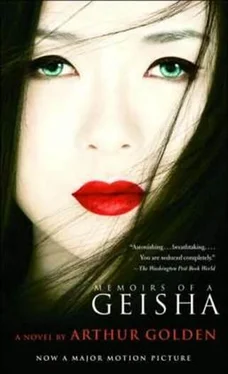“Why, look,” Hatsumomo said to her friend. “I think it must be a weed. Look how tall it is!” This was her way of ridiculing me for having grown a finger’s-width taller than her.
“Auntie has sent me here, ma’am,” I said, “to find out whose hair ornaments you stole last night.”
Hatsumomo’s smile faded. She snatched the little bundle from my hand and opened it.
“Why, these aren’t mine…” she said. “Where did you get them?”
“Oh, Hatsumomo-san!” said the other geisha. “Don’t you remember? You and Kanako took out your hair ornaments while the two of you were playing that foolish game with Judge Uwazumi. Kanako must have gone home with your hair ornaments, and you went home with hers.”
“How disgusting,” said Hatsumomo. “When do you think Kanako last washed her hair? Anyway, her okiya is right next to yours. Take them for me, would you? Tell her I’ll come to fetch mine later, and she’d better not try to keep them.”
The other geisha took the hair ornaments and left.
“Oh, don’t go, little Chiyo,” Hatsumomo said to me. “There’s something I want to show you. It’s that young girl over there, the one walking through the gate. Her name is Ichikimi.”
I looked at Ichikimi, but Hatsumomo didn’t seem to have any more to say about her. “I don’t know her,” I said.
“No, of course not. She’s nothing special. A bit stupid, and as awkward as a cripple. But I just thought you’d find it interesting that she’s going to be a geisha, and you never will.”
I don’t think Hatsumomo could have found anything crueler to say to me. For a year and a half now, I’d been condemned to the drudgery of a maid. I felt my life stretching out before me like a long path leading nowhere. I won’t say I wanted to become a geisha; but I certainly didn’t want to remain a maid. I stood in the garden of the school a long while, watching the young girls my age chat with one another as they streamed past. They may only have been heading back for lunch, but to me they were going from one important thing to another with lives of purpose, while I on the other hand would go back to nothing more glamorous than scrubbing the stones in the courtyard. When the garden emptied out, I stood worrying that perhaps this was the sign I’d waited for-that other young girls in Gion would move ahead in their lives and leave me behind. This thought gave me such a fright I couldn’t stay alone in the garden any longer. I walked down to Shijo Avenue and turned toward the Kamo River. Giant banners on the Minamiza Theater announced the performance of a Kabuki play that afternoon entitled Shibaraku , which is one of our most famous plays, though I knew nothing about Kabuki at the time. Crowds streamed up the steps into the theater. Among the men in their dark Western-style suits or kimono, several geisha stood out in brilliant coloring just like autumn leaves on the murky waters of a river. Here again, I saw life in all its noisy excitement passing me by. I hurried away from the avenue, down a side street leading along the Shirakawa Stream, but even there, men and geisha were rushing along in their lives so full of purpose. To shut out the pain of this thought I turned toward the Shirakawa, but cruelly, even its waters glided along with purpose-toward the Kamo River and from there to Osaka Bay and the Inland Sea. It seemed the same message waited for me everywhere. I threw myself onto the little stone wall at the edge of the stream and wept. I was an abandoned island in the midst of the ocean, with no past, to be sure, but no future either. Soon I felt myself coming to a point where I thought no human voice could reach me-until I heard a man’s voice say this:
“Why, it’s too pretty a day to be so unhappy.”
Ordinarily a man on the streets of Gion wouldn’t notice a girl like me, particularly while I was making a fool of myself by crying. If he did notice me, he certainly wouldn’t speak to me, unless it was to order me out of his way, or some such thing. Yet not only had this man bothered to speak to me, he’d actually spoken kindly. He’d addressed me in a way that suggested I might be a young woman of standing-the daughter of a good friend, perhaps. For a flicker of a moment I imagined a world completely different from the one I’d always known, a world in which I was treated with fairness, even kindness-a world in which fathers didn’t sell their daughters. The noise and hubbub of so many people living their lives of purpose around me seemed to stop; or at least, I ceased to be aware of it. And when I raised myself to look at the man who’d spoken, I had a feeling of leaving my misery behind me there on the stone wall.
I’ll be happy to try to describe him for you, but I can think of only one way to do it-by telling you about a certain tree that stood at the edge of the sea cliffs in Yoroido. This tree was as smooth as driftwood because of the wind, and when I was a little girl of four or five I found a man’s face on it one day. That is to say, I found a smooth patch as broad as a plate, with two sharp bumps at the outside edge for cheekbones. They cast shadows suggesting eye sockets, and beneath the shadows rose a gentle bump of a nose. The whole face tipped a bit to one side, gazing at me quizzically; it looked to me like a man with as much certainty about his place in this world as a tree has. Something about it was so meditative, I imagined I’d found the face of a Buddha.
The man who’d addressed me there on the street had this same kind of broad, calm face. And what was more, his features were so smooth and serene, I had the feeling he’d go on standing there calmly until I wasn’t unhappy any longer. He was probably about forty-five years old, with gray hair combed straight back from his forehead. But I couldn’t look at him for long. He seemed so elegant to me that I blushed and looked away.
Two younger men stood to one side of him; a geisha stood to the other. I heard the geisha say to him quietly:
“Why, she’s only a maid! Probably she stubbed her toe while running an errand. I’m sure someone will come along to help her soon.”
“I wish I had your faith in people, Izuko-san,” said the man.
“The show will be starting in only a moment. Really, Chairman, I don’t think you should waste any more time…”
While running errands in Gion, I’d often heard men addressed by titles like “Department Head” or occasionally “Vice President.” But only rarely had I heard the title “Chairman.” Usually the men addressed as Chairman had bald heads and frowns, and swaggered down the street with groups of junior executives scurrying behind. This man before me was so different from the usual chairman that even though I was only a little girl with limited experience of the world, I knew his company couldn’t be a terribly important one. A man with an important company wouldn’t have stopped to talk to me.
“You’re trying to tell me it’s a waste of time to stay here and help her,” said the Chairman.
“Oh, no,” the geisha said. “It’s more a matter of having no time to waste. We may be late for the first scene already.”
“Now, Izuko-san, surely at some time you yourself have been in the same state this little girl is in. You can’t pretend the life of a geisha is always simple. I should think you of all people-”
“ I’ve been in the state she’s in? Chairman, do you mean… making a public spectacle of myself?”
At this, the Chairman turned to the two younger men and asked that they take Izuko ahead to the theater. They bowed and went on their way while the Chairman remained behind. He looked at me a long while, though I didn’t dare to look back at him. At length I said:
“Please, sir, what she says is true. I’m only a foolish girl… please don’t make yourself late on my account.”
Читать дальше












